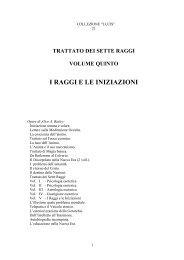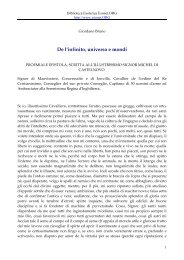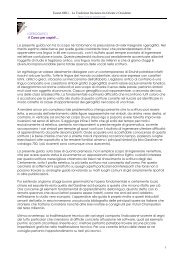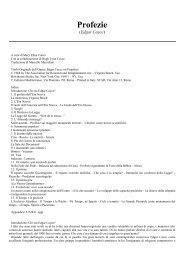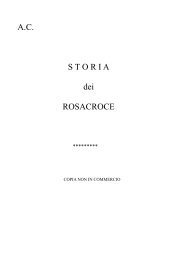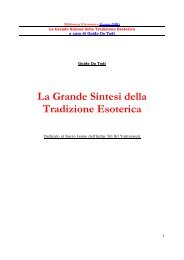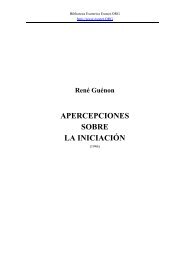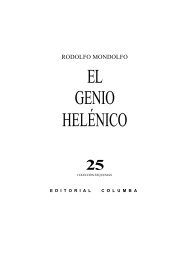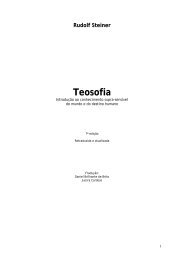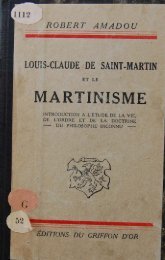Biblioteca Esoterica Esonet.ORG http://www.esonet.ORG 1
Biblioteca Esoterica Esonet.ORG http://www.esonet.ORG 1
Biblioteca Esoterica Esonet.ORG http://www.esonet.ORG 1
Create successful ePaper yourself
Turn your PDF publications into a flip-book with our unique Google optimized e-Paper software.
<strong>Biblioteca</strong> <strong>Esoterica</strong> <strong>Esonet</strong>.<strong>ORG</strong><br />
<strong>http</strong>://<strong>www</strong>.<strong>esonet</strong>.<strong>ORG</strong><br />
Transpersonal Activity versus Mediumship - 3<br />
Who is the "self" in "self-expression"?<br />
It is difficult to define the nature of both the creative process (in terms of cultural<br />
products) and the "spiritual" transfer of knowledge, healing energies, or transformative<br />
power able to produce basic changes in consciousness and the quality of the will. This is<br />
largely due to the fundamental ambiguity inherent in the word self. What does the prefix<br />
self refer to in the word self-expression? What does the word form mean in any process<br />
inducing transformation?<br />
Most students of Oriental philosophy, theosophy, mysticism, or even of today's<br />
popular psychology and "metaphysics" believe in the existence of a "higher" and a "lower"<br />
self. Some psychologists and philosophers nevertheless point out the incongruity of a<br />
person having two selves; for the term self implies identity or individuality, the latter<br />
literally meaning not-divided or indivisible and refers to the exclusivistic feeling of being<br />
"I" and no one else. Philosophically, the problem posed by the concept of two selves<br />
results from confusing the inner feeling-realization of wholeness with the nature and<br />
quality of the contents of the realizing whole. These contents may originate from two<br />
different sources and also may be interpreted in relation to two different frames of<br />
reference; yet this does not mean that one can legitimately speak of two "selves." The word<br />
self should have no plural, no more than one should speak of two "wholenesses."<br />
A human being is a whole, the contents of which (energies, impulses and unselfconscious<br />
realizations) initially belong to the level of "life." These contents are<br />
progressively modified and partially transformed; they are also interpreted in terms of a<br />
new frame of reference — the level at which cultures and societies operate. Only when the<br />
societal stage of evolution is reached do philosophers and psychologists usually begin to<br />
speak of "self." Culture-man is said to be "self-conscious," a term which often is defined as<br />
"conscious of being conscious" or objectively conscious (implying a separation between<br />
subject and object). Still, a large portion of the contents of self-conscious personhood (in<br />
either a primitive tribe or a complex modern society) remains the product of biological<br />
functions and drives and continues to be influenced by health and disease, vitality or<br />
weakness.<br />
Another portion of the contents of personality nevertheless results from the<br />
interpersonal relationships and functional (or dysfunctional) activities of a social<br />
community. A sociocultural frame of reference tends to be at least partially substituted for<br />
the basic pattern of biological drives, including the will to survival. In some cases of<br />
extreme religious asceticism or patriotic fervor, the sociocultural frame of reference may<br />
even overpower the biological drives. The experience of selfhood — that is, the<br />
centralizing feeling-realization of being "I" — and the quality of the human being's actions<br />
and "radiations" change with alterations of the balance of forces in his or her personhood<br />
152



